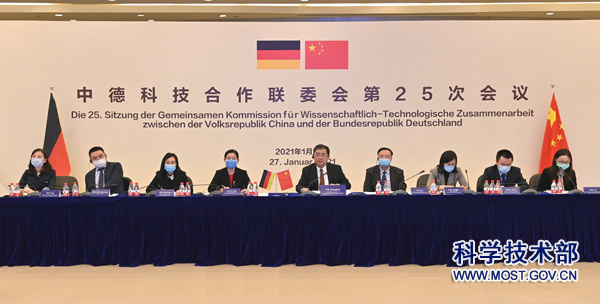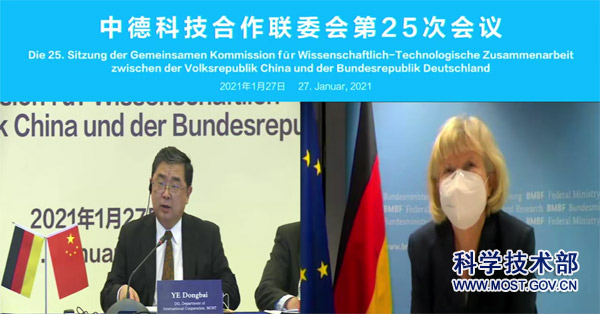

The 25th Meeting of the Joint Committee on Scientific-Technological Cooperation between China and Germany (JCM) was held via video link on January 27, 2021. The meeting was co-chaired by Ye Dongbai, Director General (DG) of International Cooperation of the Chinese Ministry of Science and Technology (MOST), and Susanne Burger, DG of European and International Affairs of the German Federal Ministry of Education and Research (BMBF). 49 representatives from 21 institutions, including, on the Chinese side, MOST, the Ministry of Foreign Affairs, the Ministry of Natural Resources, the Chinese Academy of Sciences, the National Natural Science Foundation of China, the Instrumentation Technology and Economy Institute and the Chinese Embassy in Germany, and, on the German side, BMBF, the Federal Foreign Office, the Federal Ministry for Economic Affairs and Energy, the German National Academy of Sciences, the German Research Foundation, the Helmholtz Association of German Research Centers, the Fraunhofer Society, the Max Planck Society, the German Academic Exchange Service, the Leibniz Association, the Project Management Agency at the German Aerospace Center, the Project Management Agency Karlsruhe, the Project Management Jülich, and the German Embassy in China, attended the JCM.
DG Ye said that President Xi Jinping and Chancellor Angela Merkel have made several phone calls since the outbreak of the COVID-19 pandemic, which shows a high level of political mutual trust and close strategic communication between the two sides. Since the 24th JCM held in Jiangsu in 2017, the two sides have carried out vibrant sci-tech collaboration under the inter-governmental consultation mechanism. The meetings between Minister Wang Zhigang and Minister Anja Karliczek have played an important role in promoting deep-going and results-oriented engagement in science and technology. Joint efforts in R&D, platform construction and personnel exchange have produced fruitful results, and in the field of COVID-19 response, the two sides have also worked together on vaccines, drugs and testing reagents. Looking into the future, DG Ye suggested that both sides should give full play to the coordinating role of the JCM, explore cooperation in key areas, encourage interaction among various innovation entities, and jointly address global challenges.
DG Burger echoed DG Ye’s comments, and noted the importance of sci-tech partnership in the growth of bilateral relations and its positive role in tackling global challenges. DG Burger said that cooperation between the two countries during the pandemic has produced good results, and engagement in the post-COVID era is even more important. Germany is willing to deepen partnership with China in climate protection, Industry 4.0, public health and other fields.
At the JCM, the two sides made presentations on science and innovation policies and progress, reviewed collaboration since last meeting, including policy dialogues, joint R&D, personnel exchange, and youth innovation and entrepreneurship. Both sides recognized the important role of sci-tech cooperation in the China-Germany comprehensive strategic partnership over recent years. The two sides spoke highly of the engagement between science and technology communities in fighting the coronavirus, applauded the fruits of cooperation in climate change, marine and polar research, intelligent manufacturing, and electric vehicles, and had in-depth exchanges on future priorities and forms of cooperation.

